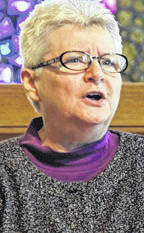
John 1: 1-5; 14, NRSV: In the beginning was the Word, and the Word was with God, and the Word was God. He was in the beginning with God. All things came into being through him, and without him not one thing came into being. What has come into being in him was life, and the life was the light of all people. The light shines in the darkness, and the darkness did not overcome it … And the Word became flesh and lived among us, and we have seen his glory, the glory as of a father’s only son, full of grace and truth.
John’s gospel begins with words reminiscent of the beginning of the Bile, when the book of Genesis tells us that God spoke the world into being. What I mean by that is God said, “Let there be light,” and then light appeared. Everything that exists came to reality through a word God spoke. John understood the Word to be Christ, and so through Christ, all things received the word that made them incarnate, made them real. And then, in the fullness of time, God spoke the Word into being, and Christ was made incarnate as Jesus of Nazareth.
How does a spoken word become a real living being? The deep mysteries of God’s action in the world will take eternity to comprehend. But I do know that often a word of blessing spoken by a family, offering us affirmation for a talent can open up a life-long pursuit of honing that gift. And, sadly, a word that belittles us can burn in us and become a self-fulfilling prophecy of a life distorted and degraded. Words hold power and God’s word holds ultimate power to raise up, bless, create, edify, challenge and comfort.
One way to think about the power of blessing is explained in the book, “The Five Love Languages” by Gary Chapman, a pastor from North Carolina, about how to build better marriages and relationships by knowing the love language of your partner. Chapman’s idea is that each of us needs to be loved in a certain way. Needs to give love in a certain way. Some of us want roses and poetry. Some of us want someone willing to unclog the sink, or to notice and appreciate when we unclog the sink. Chapman has identified these love languages: Gift Giving; Quality Time; Physical Touch; Acts of Service; Words of Affirmation.
And what sometimes happens is that our love language is not the same as our partner’s. One of us may find that a well-chosen gift is a way of saying, I see you. I get you. But to others a gift is just a material thing and not as soul-stirring as being told, in simple and direct words, how our loved one sees and knows us. Some find it hard to say it in words but are saying it in every morning cup of coffee, in every mile driven to visit the in-laws, in every game of Rummikub. It may be a good thing when we speak a different love language from our mate, so we can be stretched to learn to translate, to shape our actions and words to fit the needs of the ones we love.
Some people suffer from receiving a lack of love language, a poverty of positive regard, and so their love vocabulary might be smaller, and less eloquent. But I think in all of us there is a deep well of love testimony that is waiting to be unleashed, and who knows, maybe that is what happened on the Day of Pentecost, the well of praise overflowing into languages the believers did not know they spoke. When we answer the call to follow God we often find ourselves doing things we did not know we were capable of, which might be as simple as writing a check to the church or listening patiently to a friend who has begun to repeat herself.
What God pours out in the mystery of the incarnation is a new vocabulary of divine speech. Jesus is God’s love language — the grammar of grace made flesh. In Jesus, the Word is less abstract and more tangible. The desire of God to bless humanity has a face, a name, a family.
Each of us has the chance to consider how the language of love that has been spoken to us in Christ can now be spoken through us, as we speak and act and pray and serve in the love languages most fluent to us; translating the good news so that its message can be heard in every language, in every heart that longs to know and receive the light of the world.




